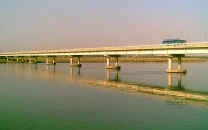‘Federalism can help fix Pakistan’
Workshop discussed the importance of federalism for Pakistan.

"A federation was the most suitable system for governing diverse societies, but very few people understood that," says Chandio.
Addressing a workshop on Issues and Deficits of Pakistan’s Federalism, organised by Freedomgate Pakistan and Friedrich Naumann Foundation for Freedom (FNF), Chandio said history books mentioned the Constitution but did not elaborate on its importance. He said a federation was the most suitable system for governing diverse societies, but very few people understood that. He said most demands by nationalist parties would be met by federalism, but since it is neither followed nor taught, people are wont to misunderstand it.
“Federalism provides a win-win scenario where every constituent system within a state feels well protected,” he said. However that has never been applied to Pakistan, he added.
Chandio said a federation was an open system which promoted and protected diversity. “We made a mistake by imposing the demands of a minority on the majority,” he said.
When Urdu was declared the only national language of Pakistan the majority felt deprived of the right to protect their own language and culture.

“We could have made all indigenous languages our national languages and kept Urdu as a lingua franca,” he said.
He said six National Finance Commission (NFC) awards had based resource allocation on population alone so that the largest province by land mass, Balochistan, felt discriminated against. He said the seventh NFC award that took into account factors like the Human Poverty Index and geography would benefit Balochistan.
“Concepts like provincial autonomy, democracy and freewill, enshrined in federalism, are essential for governing a society as diverse as Pakistan’s,” he said.
Published in The Express Tribune, February 18th, 2013.


















COMMENTS
Comments are moderated and generally will be posted if they are on-topic and not abusive.
For more information, please see our Comments FAQ